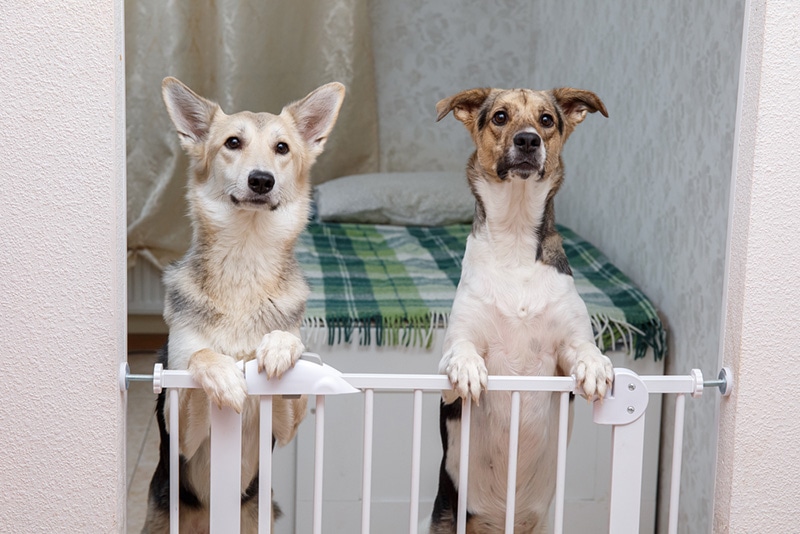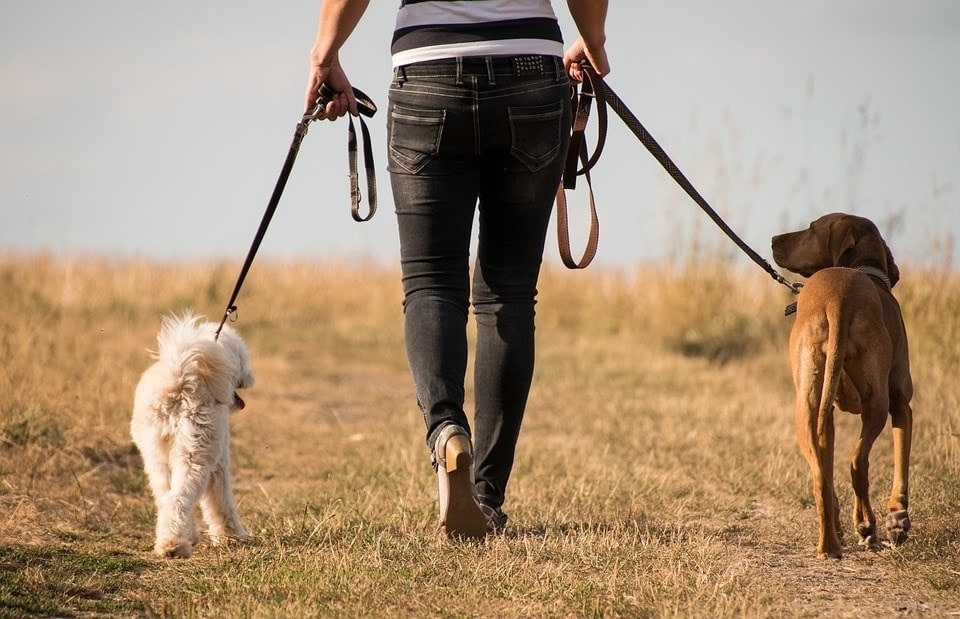Pros & Cons of Getting a Second Dog: Vet Approved Advice & Guidance
Updated on

There are a lot of wonderful aspects of owning a dog, especially the positive benefits both you and your dog get from sharing each other’s companionship. Sometimes, though, it might feel like your little family is incomplete in a way that only another dog can solve. Having two dogs can be twice as much fun, but it can also be twice as much work, so it’s important to weigh all of the pros and cons of bringing home another dog before you actually go through with it.
The 5 Pros of Getting a Second Dog
1. Double the Fun
The most obvious benefit to bringing home a second dog is the added fun of an extra companion for you and your current dog. There’s twice as much fun to be had with a second dog around. Games and exercise sessions may last longer with two dogs guiding things, helping everyone burn more energy and stay healthier.

2. Added Companionship
Adding another dog to your household adds more companionship for everyone. This can be especially beneficial for a dog. Oftentimes, our dogs are home alone all day while everyone is at school and work. It can be boring and lonely, and having a canine companion will likely decrease your dog’s boredom and stress when left alone. You will also have a “backup” companion if one of your dogs isn’t feeling up to playing or going for a walk.
Another dog also brings another personality into the mix. Maybe you’ll end up with one that is more cuddly and one that is more playful, allowing you the best of both worlds.
3. Improved Socialization
Socialization is an important aspect of raising your dog, and one part of socialization is learning how to interact with other animals. Having a canine companion in the household can help provide socialization for both dogs, allowing them to practice and improve those social skills. In some cases, the presence of a calm dog they are familiar with can help anxious dogs feel safer and adjust to new situations, people, and animals faster and with less stress.

4. Enhanced Focus
While there is a chance that a second dog may cause both dogs to ignore you, there’s also a good chance that the presence of a second dog will help both dogs focus on training and commands. Sometimes, if a dog sees another dog acting a certain way and receiving praise and rewards for it, then they will learn to mimic the behavior. Seeing another dog perform a trick can also make it easier for the second dog to understand what you’re asking of them when they’re given a command.
5. Provide Homes for Two Dogs
The more dogs you have, the more dogs you’re providing a home for. Providing a home for a dog from a breeder can ensure they go to a good home, but providing a home for a dog from a shelter or rescue organization can be the difference between life and death for that dog. By bringing home a second dog, you’ll be doing a second dog the same favor. Two dogs will be provided with safety, comfort, and love for the rest of their lives.

The 5 Cons of Getting a Second Dog
1. Double the Work
Simply put, two dogs mean two times the work. You’ll be picking up poop behind two dogs, lugging two dogs to the vet, training two dogs, providing exercise for two dogs, and cleaning up twice as much dog hair. You should be prepared for the commitment that a second dog will require. While some dogs may jump right into the routine your current dog already has, there’s also the potential that you’ll end up with a second dog that wants their own unique routine.

2. Potential for Clashes
Since a second dog also brings another personality into your house, there are no guarantees that the two personalities will get along. No matter how friendly your current dog is, there is a chance that the dogs simply won’t get along. There’s also the potential that your dogs will get along, but there will be issues related to other pets in the home, especially cats and small animals. It’s common for things to be a little bit tense in the beginning while everyone learns the routine and structure of things with another dog in the mix, but in some situations, the tension doesn’t go away with time.
3. Codependency
On the opposite end of the spectrum from your dogs not getting along is the risk of codependency. Some animals closely bond to the point that they become extremely stressed without their companion. This is most common in littermates and young dogs that are raised together, but it can occur anytime for some dogs.
There is also a small possibility that your dogs will become so dependent on each other that they are no longer dependent on you. This means that you may have problems with things, like both dogs ignoring commands, choosing instead to pay attention to each other.

4. Double the Cost
Obviously, adding a second dog will increase the amount of money you have to spend on your pets. You’ll be buying food, preventive medications, and toys for two dogs. You’ll also be paying for two dogs to see the vet every year instead of one. Boarding and pet sitting fees are increased, and you’ll need twice as much equipment so both of your dogs can have leashes, collars, and food and water bowls.
5. Saying Goodbye Twice
The worst part of owning pets is having to say goodbye, and no matter how you slice it, dogs just don’t live long enough for anyone’s liking. By bringing home a second dog, you’re setting yourself up for this hard goodbye twice. It can be hard on dogs to lose a companion, whether human or canine, and you already know it will be hard on you. In cases of a tight bond between two dogs, the grieving process after the loss of a companion can be very difficult for the remaining dog.

I Want to Bring Home a Second Dog to Help My Reactive Dog
If your current dog is reactive or aggressive toward other animals or people, it may be tempting to want to bring home a second dog as a means of improving their socialization and reducing their reactivity. Unfortunately, this is a risky plan, at best.
It can be difficult for a reactive or aggressive dog to accept a new pet in their home, and some will never be able to be trusted around the second dog no matter how hard you try. There are some situations in which you can introduce a second dog to a reactive dog successfully, but it’s best to work with a board-certified veterinary behaviorist before even trying to bring a second dog home. They will help you and your current dog work through their issues instead of relying on a second dog to be the magic fix.
Have a Backup Plan in Place
After making the decision to give a second dog a try, make sure to have a backup plan. This just means that you have a safe alternative for that second dog should it not work out. Fortunately, most shelters, rescues and breeders will offer a trial period before you commit to a dog. This will allow your family and other dog a chance to get to know the second dog to make sure it’s a good fit before you’re committed to keeping them. This will ensure the safety and happiness of both dogs and your family.
What you don’t want to have happen is to commit to a second dog that compromises their safety or that of your family or other dog. You also don’t want to end up with a second dog on your hands that isn’t working out and not having a good option for rehoming them if needed.
Conclusion
Bringing home a second dog can be a lot of fun, but it also requires quite a commitment. A second dog means twice as much of everything, including poop and dog hair. It also means spending twice as much money. There can be benefits to bringing in a second dog, though. It can provide companionship and socialization for your current dog. It’s important for everyone’s safety that you make an honest assessment of your current dog’s temperament and behaviors, as well as your household’s habits and activities before bringing in a second dog.
Featured Image Credit: dezy, Shutterstock















